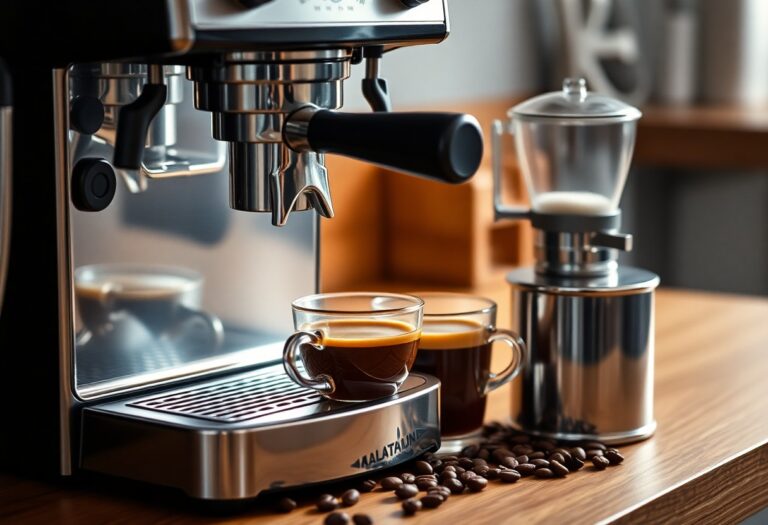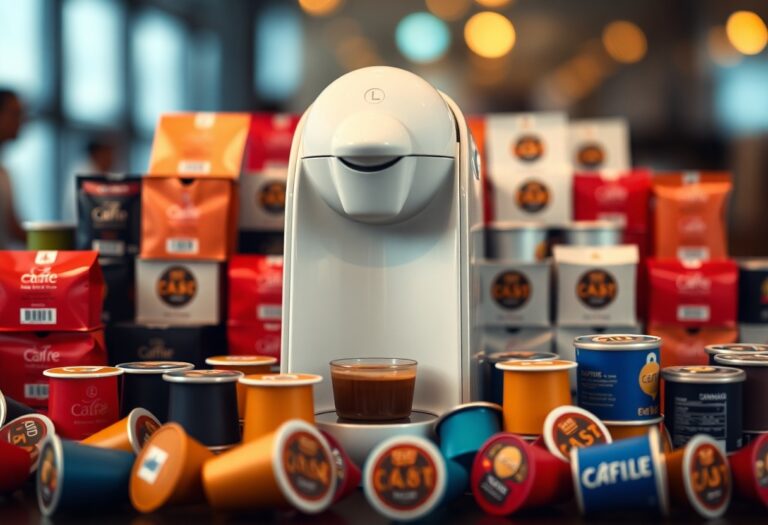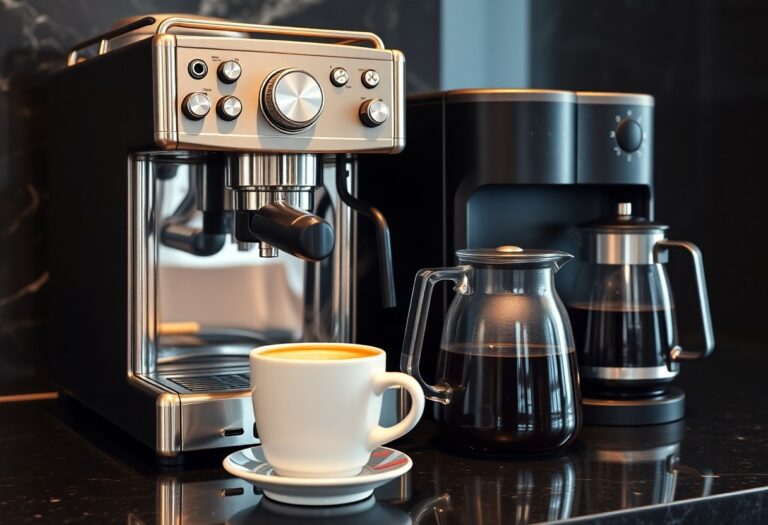How Much Does a Coffee Machine Cost – Complete Price Guide
You may be surprised by the wide range of prices for coffee machines available on the market. From budget-friendly options to high-end espresso makers, understanding your needs and budget is vital in making an informed decision. In this complete price guide, you will discover the various types of coffee machines, their price points, and what you can expect in terms of features and quality. This information will help you choose the perfect machine that fits both your lifestyle and your wallet.
Key Takeaways:
- The cost of coffee machines varies widely, ranging from budget-friendly options around $20 to high-end models exceeding $2,000.
- Factors affecting the price include the type of machine (drip, espresso, single-serve), brand reputation, and additional features like built-in grinders and programmable settings.
- Maintenance and operational costs, such as water filters and cleaning supplies, should also be factored into the overall cost of owning a coffee machine.
- Buying coffee machines during sales events or considering refurbished models can lead to significant savings.
- Understanding personal coffee preferences and usage frequency helps in selecting the most suitable machine for your budget and needs.

The Financial Spectrum: Entry-Level to Luxury Machines
Your coffee journey can start at an entry-level machine costing around $20, designed primarily for casual drinkers. In contrast, luxury models can exceed $2,000, equipped with advanced features and built to satisfy the most discerning coffee aficionados. Understanding the nuances of pricing can help you decide based on your personal preferences and needs. For example, the cost (to the manufacturer) of a ‘prosumer’ espresso machine can give insight into why high-end models command such a premium.
Budget-Friendly Options: What You Get for Less
Budget-friendly machines typically range from $20 to $100. These models often feature basic brewing mechanisms and limited customization, suitable for those who appreciate simplicity. While you may sacrifice some quality and durability, many still produce a decent cup of coffee for everyday use.
Mid-Range Marvels: Balancing Quality and Cost
Mid-range coffee machines, ranging from $100 to $800, strike an appealing balance between affordability and performance. These machines often come packed with features that allow you to experiment with brewing techniques while ensuring a consistent quality in your cup. Investing in a mid-range model often means a significant upgrade in both flavor and reliability.
For example, a mid-range espresso machine will often include features like adjustable temperature controls, built-in grinders, and frothing wands that give you a taste of the coffee shop experience at home. Models such as the Breville Barista Express or Gaggia Classic provide a fantastic balance of quality construction and brewing options that cater to both beginners and seasoned coffee lovers.
Top-Tier Investments: Are They Worth the Price?
Top-tier coffee machines often start around $800 and can climb beyond $2,000, prioritizing precision and craftsmanship. If you’ve been contemplating the steep investment, consider the long-term benefits of enhanced flavor profiles, consistency, and durability in high-end options.
High-end machines often employ advanced technology and premium materials, which not only ensure superior brewing but also add aesthetic value to your kitchen. Brands such as La Marzocco and Slayer, well-renowned in the specialty coffee industry, reflect how a top-tier investment can transform your daily caffeine ritual into an art form. The longevity and quality of these machines may also save you money in the long run, as they require fewer replacements and repairs.
Cost Breakdown: Beyond the Purchase
Understanding the overall investment in a coffee machine goes beyond the initial purchase price. You’ll need to factor in maintenance costs, repair expenses, and additional accessory purchases. These hidden costs can accumulate over time, affecting your total budget significantly. It’s not just about buying the machine—consider ongoing operational costs and enhancements that can elevate your coffee experience.
Maintenance and Repair: Hidden Expenses to Consider
Regular maintenance is key to keeping your coffee machine in optimal condition and can include professional cleanings, descaling agents, and replacement parts. While many machines come with a warranty, you may still face out-of-pocket expenses for repairs outside this coverage. It is advisable to set aside a budget of about 10-15% of your machine’s cost annually for these maintenance and repair needs to ensure longevity.
Accessories and Upgrades: Enhancing Your Coffee Experience
Investing in accessories can significantly enhance your brewing experience, ranging from high-quality grinders and frothers to specialized coffee beans and water filters. Upgrades like programmable timers, premium milk systems, or even aesthetic enhancements can transform your kitchen setup and elevate your daily coffee ritual.
When you consider accessories, think about your personal coffee preferences. For example, a top-tier grinder can cost between $50 and $300, while a quality milk frother may run you about $20 to $100. Adding these tools doesn’t just improve the quality of your coffee but can also streamline your preparation process. A well-curated collection of accessories tailored to your taste can turn an average cup into a café-quality experience, making it well worth the investment.
The Impact of Brand and Design on Cost
When dicking out a coffee machine, the brand and design significantly influence its price. Premium brands often carry a higher cost due to their reputation for quality, durability, and customer service. For an extensive range of options, explore Coffee Makers & Espresso Machines that showcase varying designs and brands, attracting diverse budgets and preferences.
Brand Reputation: How It Affects Pricing
Well-established coffee machine brands like Breville and De’Longhi often have higher price tags, reflecting their investment in research, development, and customer service. As these brands provide consistent performance and durability, users typically regard them as worth the extra expense. You might find that spending a bit more on a reputable brand leads to fewer replacements and repairs over time.
Design Aesthetics and Functionality: Evaluating Value
The design of a coffee machine can influence not just its appearance but its usability, impacting the overall value you receive. Machines that integrate advanced technology or innovative features may command higher prices, but they can enhance your coffee brewing experience, justifying the investment.
Choosing a coffee machine often involves weighing aesthetics against functionality. A sleek, modern design can enhance your kitchen’s look, while practical features like programmable settings and easy-to-use interfaces can save you time and effort. Carefully consider how design impacts your enjoyment and consistency in brewing. A machine that visually pleases you and performs reliably can be a sound investment, both in your daily routine and in your kitchen’s overall ambiance. Prioritizing your preferences is key to determining if the price aligns with the value you perceive in each machine.

Navigating Seasonal Sales and Discounts
Identifying the right time to purchase can significantly reduce your expenses on a coffee machine. Seasonal sales, such as Black Friday, Cyber Monday, and post-holiday clearance events, are prime opportunities to find great deals. Retailers often mark down prices to clear out inventory and entice holiday shoppers, making it a perfect moment for savvy consumers like you.
Best Times to Buy: When Prices Drop
Take advantage of major shopping holidays, including Labor Day and Memorial Day sales, as well as Amazon Prime Day, since that’s when popular coffee machines see the most substantial price reductions. Additionally, new models are typically released in the spring, which results in discounts on older versions to make room for new inventory.
Maximizing Value: What to Look for in Promotions
Look beyond mere price cuts for promotions that enhance your purchase. Consider bundled offers that include accessories or subscriptions to coffee services, which can add immense value. Promotions may also feature warranties or extended return policies, which can ensure you’re covered if any issues arise with your new machine.
You should scrutinize the total savings from promotions, focusing on whether additional items justify a slightly higher price. For instance, a coffee machine discounted by $30 might seem appealing, but if it includes a $50 accessory set, you’re looking at an overall better deal. Free shipping offers further enhance value, as they cut down on hidden costs that can sneak up on you. Lastly, keep an eye on any financing options; taking advantage of low or zero-interest plans allows you to spread out substantial costs without incurring extra fees. By carefully navigating promotions, you can optimize your investment in a coffee machine.
The Value Proposition: Are Expensive Machines Worth It?
Investing in an expensive coffee machine often equates to high-quality performance and durability. While initial costs can be intimidating, these machines typically boast advanced features—such as programmable settings and robust brewing systems—that enhance your overall coffee experience. The difference in quality can lead to consistent barista-level brews, which can justify the higher price tag if coffee is a cornerstone of your daily routine.
Long-Term Cost vs. Short-Term Savings
Opting for cheaper machines may seem wise initially, yet long-term costs often eclipse savings. High-quality machines can last years longer than their budget counterparts, resulting in fewer replacements and repairs. Should you consider maintenance, energy efficiency, and coffee quality, investing upfront can lead to significant savings down the line.
Personal Preference: How to Align Coffee Quality with Spend
Your coffee preferences play a vital role in determining which machine to purchase. A more expensive model may offer features like temperature control, brew strength settings, or integrated grinders that suit an adventurous palate. Aligning what you value in coffee with what you’re willing to spend ensures you’re making an informed decision that results in satisfaction with every brew.
Take a moment to reflect on whether you crave the nuanced flavors of a meticulously brewed espresso or prefer the simplicity of drip coffee. If you desire versatile brewing options, investing in a higher-end machine may enhance your experience. For minimalist coffee drinkers, a mid-range machine may suffice. Ultimately, determining how much you’re willing to invest in the quality of your coffee will guide your choice and ensure alignment with your lifestyle and taste preferences.
To wrap up
On the whole, understanding the cost of a coffee machine can help you make an informed decision tailored to your needs and budget. From basic models to high-end espresso machines, prices can vary significantly. By evaluating your preferences and intended usage, you can find the right coffee machine that fits your lifestyle without overspending. Consider your options carefully, and you can enjoy café-quality beverages at home while staying within your financial plan.
Q: What is the average cost of a basic drip coffee machine?
A: The average cost of a basic drip coffee machine typically ranges from $20 to $60. These machines are straightforward, offering standard features and are suitable for straightforward brewing needs.
Q: How much should I expect to pay for an espresso machine?
A: The price of espresso machines varies widely depending on their features and capabilities. Entry-level machines can start at around $100, while high-end models can exceed $2,000. Most mid-range espresso machines are within the $300 to $800 range.
Q: Are single-serve coffee makers more expensive than traditional machines?
A: Yes, single-serve coffee makers, such as Keurig or Nespresso machines, often range from $60 to $200, depending on the model and features. The convenience factor plays a significant role in their pricing, along with the cost of coffee pods required for operation.
Q: What factors influence the price of a coffee machine?
A: Several factors contribute to the price of a coffee machine. These include the type of machine (drip, espresso, single-serve, etc.), brand reputation, additional features (like programmable settings, grinders, or milk frothers), and build quality. High-quality materials and advanced technology can increase the overall cost.
Q: Do I need to budget for additional costs when purchasing a coffee machine?
A: Yes, in addition to the initial purchase price, it’s wise to consider ongoing costs. This can include coffee beans or pods, filters, water softeners, descaling solutions, and eventual maintenance or replacement parts. These factors can significantly impact your overall investment in coffee brewing.







